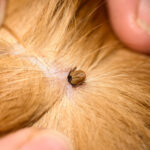The entire family loves Easter. We love all the chocolate and Easter candy. We love Easter Egg hunts; hiding the eggs and watching the kids go crazy trying to find them. And most of all we love Easter dinner with all the traditional fixings.
As much as we love Easter, it can be especially toxic for our furry family members. Some foods commonly served during Easter can be dangerous to our dogs and cats.
Here are some foods to watch out for:
1. Chocolate: Chocolate contains a chemical called theobromine, which is metabolized much more slowly in dogs and cats than in humans, making it toxic to them in certain quantities. The severity of the toxicity depends on the amount and type of chocolate consumed, as well as the size and weight of the animal.
In general, darker chocolates and unsweetened baking chocolates are more toxic than milk chocolate or white chocolate, which contain less theobromine.
I remember one time Spencer got into the pantry and took out a bag of small crunch bars. He ate a few of them, I was so worried I called the Vet he said not to worry because the chocolate content was low, and Spencer was a large dog. I remember Spencer just laying there with a very satisfied look on his face. After that incident, all chocolate was locked away where he couldn’t sniff it out.
Symptoms of chocolate poisoning can include vomiting, diarrhea, rapid breathing, increased heart rate, seizures, and even death.
2. Candy and sweets: Many Easter candies and sweets contain xylitol, an artificial sweetener that can be toxic to dogs and cats. Xylitol can cause a sudden release of insulin, which can lead to hypoglycemia (low blood sugar).
The onset of symptoms can be rapid, occurring within 30 minutes to 12 hours after ingestion. Symptoms can include vomiting, seizures, tremors, jaundice, black-tarry stool, loss of coordination.
3. Hot cross buns: A traditional Easter food, many recipes contain raisins. Both raisins and grapes can be toxic to dogs and cats and can cause kidney failure.
Symptoms of raisin or grape toxicity can include vomiting, diarrhea, lethargy, and decreased appetite.
4. Fatty foods: Foods that are high in fat, such as ham or lamb can cause digestive upset in pets. In addition, fatty foods can also lead to pancreatitis, a painful inflammation of the pancreas that can be life-threatening if left untreated.
Symptoms of pancreatitis can include vomiting, diarrhea, loss of appetite, and abdominal pain.
How many times have you enjoyed an Easter egg hunt with the kids only to have your dog run around and try to participate?
Dogs have a keen sense of smell and can easily find hidden treats, including chocolate eggs.
Plastic eggs used for Easter egg hunts can pose a risk to dogs if they chew and ingest them. The plastic can cause a blockage in the digestive tract, which can be a life-threatening emergency that requires surgical intervention.
If you do decide to have your 4-legged kids participate in the hunt why not make it dog friendly? Consider using non-toxic treats for the hunt, such as small, bite-sized pieces of carrots or pet-friendly snacks. Your kids can swap out these treats for their favorite candy.
Children love all the goodies that they find in their Easter baskets. While it is understandable that kids may want to share their Easter candy with their pets, it is important to teach them about the potential dangers of feeding human food to pets.
Encourage them to show affection and treat their pets with toys, pet-friendly treats, and plenty of love and attention instead of giving them human food.
If your child accidentally feeds your pet Easter candy or table scraps, monitor your pet for any signs of illness, and contact your veterinarian immediately if you notice any concerning symptoms. It is always better to err on the side of caution and seek veterinary care as soon as possible if you suspect that your pet has ingested something toxic.




